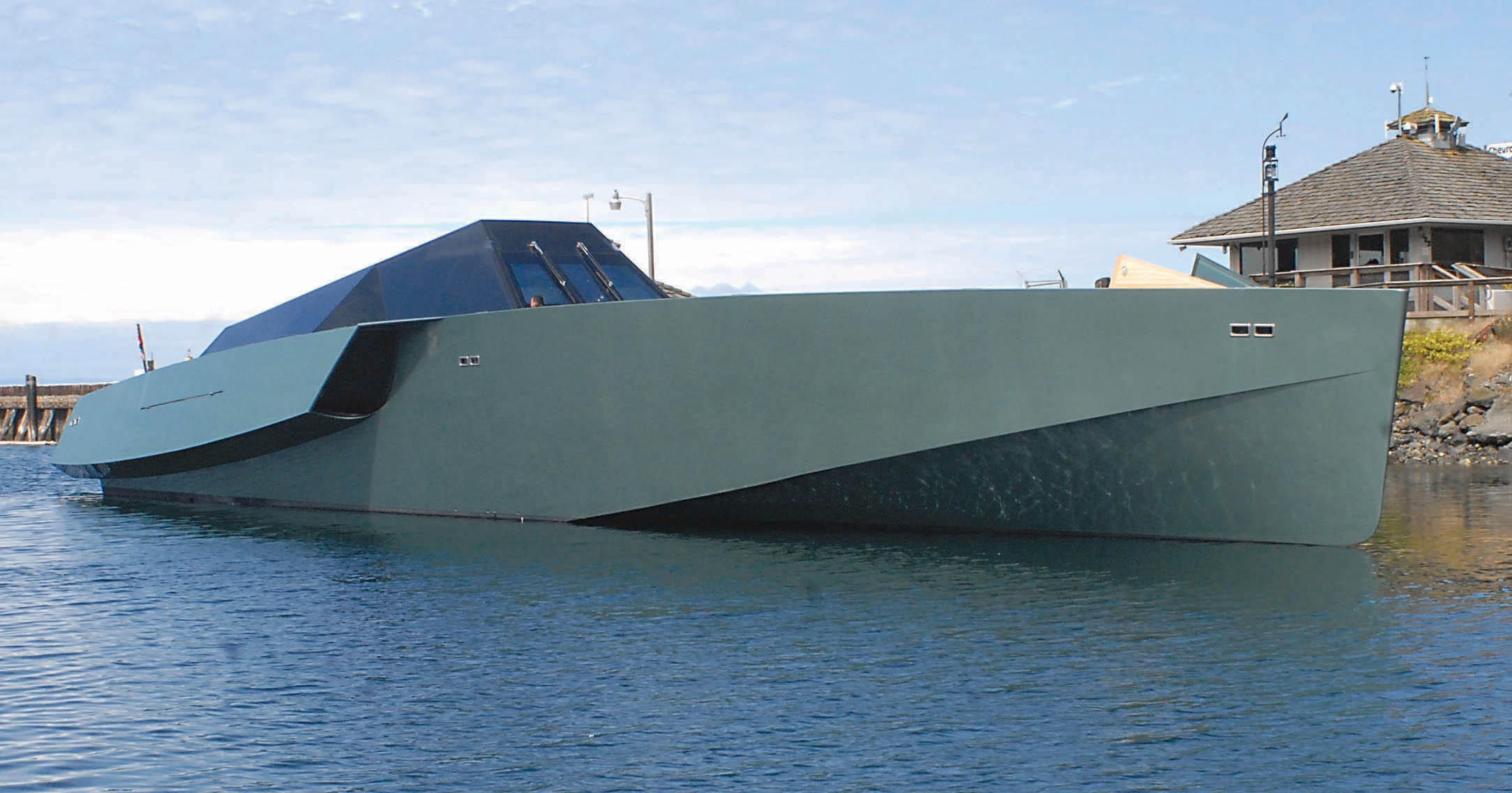(PDN’s “On the Waterfront” Sunday column)
PORT ANGELES — Galeocerdo — which is the genus name of the tiger shark — came into the Port Angeles Boat Haven for a load of fuel on Friday afternoon.
The unique-looking vessel conjures images of the Batmobile or something out of “Star Wars.”
The 118-foot vessel was built of composite materials by Wally Yachts in Italy in 2003.
She is powered by three gas turbine Detroit Diesel engines that generate 16,800 horsepower, which will push the boat up to 60 knots.
She also has two auxiliary Cummins diesel engines, each of which delivers 370 horsepower and are used for close-quarter maneuvering and cruising at the more comfortable speed of 9 knots.
I understand that Galeocerdo was most recently in Mexico’s Baja California state cruising in the Sea of Cortez and is on her way north to spend the balance of the summer season cruising in British Columbia.
Superyachtfan.com, “the most comprehensive overview of superyacht owners,” doesn’t list a current owner for the Galeocerdo.
But you can read more about this unusual vessel — with photos of its layout inside — at http://www.superyachttimes.com/sale/details/327.
The feminine mystique
Thanks and a tip of the bosun’s cap to Linda Bruch of Port Angeles.
She asked me why ships yachts and boats are referred to as “she.”
The explanation that follows is from the Naval History and Heritage Command’s website, www.history.navy.mil, which attempts to explain the Navy’s jargon, traditions, protocols and such for the lay person:
“Throughout our existence Humankind has personified inanimate objects and attached to them characteristics peculiar to living creatures.
“Thus, things without life are often spoken of as having a gender.
“Some objects are regarded as masculine. The sun, winter, and death are often personified in this way.
“Others are regarded as feminine, especially those things that are dear to us.
“The earth as mother Earth is regarded as the common maternal parent of all life.
“In languages that use gender for common nouns, boats, ships, and other vehicles almost invariably use a feminine form.
“Likewise, early seafarers spoke of their ships in the feminine gender for the close dependence they had on their ships for life and sustenance.”
Arro hauled out
Keith Benson of Vashon Island came to Port Angeles recently to have his boat, Arro, hauled out at the Port Angeles Boat Yard.
If my memory doesn’t fail me now, this is the third year Keith has graced the facility with his business.
This year, as in his prior visits, Keith painted the vessel’s bottom.
This year, he painted over the boot stripe, which he applied last year because it was not historically correct.
Another historical item that Keith said needed correcting was to clarify one Herbert Hoover’s ownership of Arro.
Keith said after much research he was able to confirm that Herbert A. Hoover shared ownership of the 50-foot wooden fantail yacht with the Arro Oil Refinery of Lewiston, Mont.
Until Keith was able to nail down that piece of information, he was under the impression that Herbert C. Hoover, the 31st U.S. president, was a prior owner.
Arro was back in the water by the end of the week, and Keith said he was going to cruise up to Bute Inlet in British Columbia for a few days before heading home.
Adelie at Platypus
Earlier this week, Platypus Marine, the full-service shipyard, yacht-repair facility and steel-boat manufacturer on Marine Drive, hauled out Adelie, one of two 87-foot patrol boats attached to the Coast Guard station on Ediz Hook.
She will be out of service for about six weeks, during which time personnel will perform maintenance on the props and shafts, as well as sand blast, prime and paint the vessel.
In addition to an untold number of maintenance and upgrade items that are to be performed, the fuel tanks and gray water tanks will be emptied, cleaned and inspected, and their respective lines will be power flushed and replaced as necessary, as will any related valves.
I understand there are nine of this class of Coast Guard cutter in the Puget Sound region and that every four years, each of these vessels is taken out of service to deal with similar maintenance items.
Tankers bunkered
Tesoro Petroleum on Tuesday bunkered British Courage, a 754-foot LPG tanker that is flagged in the United Kingdom.
Tesoro also provided bunkers to Polar Discovery, an 895-foot crude oil tanker that is flagged in the U.S. and hails from Long Beach, Calif.
Tesoro on Wednesday refueled Alaskan Legend, a 942-foot crude oil tanker that hails from Portland, Ore.
Tesoro bunkered Cygnus, a 600-foot petroleum products carrier that is flagged in Hong Kong, on Thursday.
________
David G. Sellars is a Port Angeles resident and former Navy boatswain’s mate who enjoys boats and strolling the area’s waterfronts.
Items and questions involving boating, port activities and the North Olympic Peninsula waterfronts are always welcome. Email dgsellars@hotmail.com or phone him at 360-808-3202.
His column, On the Waterfront, appears Sundays.

